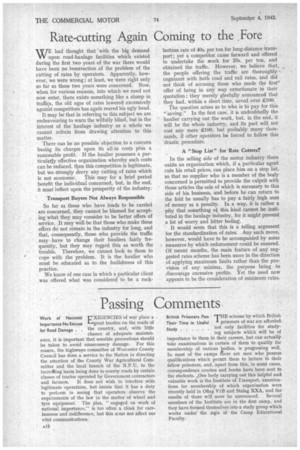Rate-cutting Again Coming to the ,Fore
Page 14

If you've noticed an error in this article please click here to report it so we can fix it.
WE had thought that with the big demand upon road-haulage facilities which existed during the first two years of the war there would have been no iesurrection of the problem of the cutting of rates by operators. Apparently, however, we were wrong; at least, we were right only so far as these two years were concerned. Now, when for various reasons, into which we need not now enter, there exists something like a slump in traffics, the old ogre of rates lowered excessively again-st competitors has again reared his ugly head.
It may be that in referring to this subject we are endeavouring to warn the wilfully blind, but in the interest of the haulage industry as a whole we cannot refrain from drawing attention to this matter.
There can be no possible objection to a concern basing its charges upon its all-in costs phis a reasonable profit. If the haulier possesses a particularjy effective organization whereby such costs can be reduced, then this competition is legitimate, but we strongly decry any cutting of rates which is not economic. This may for a brief period benefit the individual concerned, but, in the end, it must 'reflect upon the prosperity of the industry.
Transport Buyers Not Always Responsible So far as those who have loads to be carried are concerned, they cannot be blamed for accepting what they may consider to be better offers of service. It may well be that those who make these offers do not remain in the industry for long, and that, consequently, those who provide the traffic • may --have to change their hauliers fairly frequently, but they may regard this as worth the trouble. Therefore, we cannot look to them to cope with the problem. It is the haulier who must be educated as to the foolishness of this practice.
We know of one case in which a particular client was offered what was considered to be a rock bottom rate of 40s. per ton for long-distance transport ; yet a competitor came forward and offered to undertake the work for 25s. per ton, and obtained the traffic. However, we believe that, the people offering the traffic are thoroughly cognizant with both road and rail rates, and did not think of accusing those who made the first" offer of being in any way extortionate in their quotation ; they merely gleefully announced that they had, within a short time, saved over £100. The question arises as to who is to pay for this "Saving." In the first case', it is undoubtedly the haulier carrying out the work, but, in the end, it will be the whole industry, and its part will not cost any mere £100, but probably many thousands, if other operators be forced to follow this drastic procedure.
A "Stop List" for Rate Cutters?'
In the selling side of the motor industry there exists an organization which, if a particular agent cuts his retail prices, can place him on a stop list, so that no supplier who is a member of the bosiy concerned is permitted to provide the culprit with those articles the sale of which is necessary to this side of his business, and before he can return to the fold he usually has to pay a fairly high sum of money as a penalty. In a way, it is rather a pity that something of this kind cannot be instituted in the haulage industry, for it might prevent a lot of worry and bitter feeling.
It would seem that this is a telling argument for the standardization of rates. Any such move, however, would have to be accompanied by some measures by which enforcement could be ensured. Of recent months, the main feature of any suggested rates scheme has been more in the direction of applying maximum limits rather than the provision of any minima, the purpose being to discourage excessive profits. Yet the need now appears to be the consideration of minimum rates.




















































